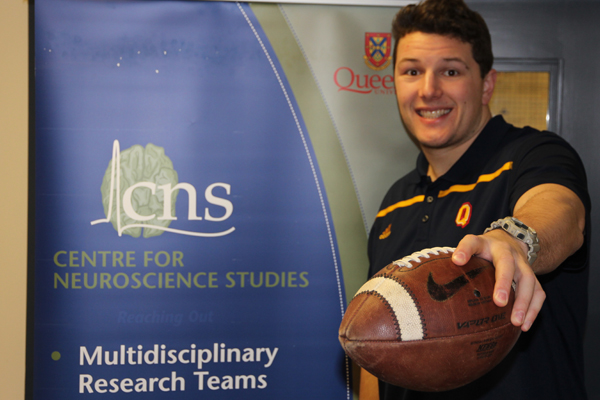A heads-up approach to sports safety
January 6, 2016
Share
Concussions in youth sport have received wide-reaching attention over the past decade. Recent legislation introduced in Ontario aims to set province-wide guidelines for treatment of concussions and return-to-play protocols. Closer to home, Queen’s University student-athlete Allen Champagne (MSc’17) has launched an education program to teach youth football players how to play the game safely while reducing the risk of concussions.

“Having both a football background and a neuroscience background, I saw a perfect opportunity to merge them,” says Mr. Champagne, who is currently conducting research on concussions alongside Dr. DJ Cook (Medicine). “The program brings together graduate students, medical students and athletes to create the ultimate program, where we can educate young athletes about concussions and then use on-field drills to reinforce the lesson.”
A defensive lineman for the Queen’s Gaels football team, Mr. Champagne designed the Concussion Education, Safety and Awareness Program (CESAP) to promote concussion awareness and teach young athletes safe techniques to reduce their risk of concussions. Using behaviour modification, he hopes to make players recognize unsafe techniques, such as leading with their helmets into contact. In correcting players’ techniques, he aims to improve their on-field performance while reducing the likelihood of concussions.
The program was inspired by research conducted during his undergraduate studies at the University of North Carolina at Chapel Hill under Dr. Kevin Guskiewicz. Players who had taken part in a similar educational program showed a decrease in the number and intensity of helmet impacts over the course of a season, as measured using helmet-mounted accelerometers.
“The CESAP program Allen has designed emphasizes the need for proper technique and safer contact,” says Pat Sheahan, head coach of the Queen’s Gaels football team. “This will bring greater local attention to the important issue of concussion awareness and will make the game safer for players.”
Over the course of the half-day program, players, coaches and parents are first taught about concussions – how they occur and what signs and symptoms may appear. Players are also taught how to ensure their helmets and shoulder pads are properly sized, as well as the importance of safe play.
Following the seminar, players suit up for approximately two hours of position-specific on-field drills. Under the watchful eyes of volunteer coaches (many of whom are current and former Gaels), the players’ technique will be analyzed for any unsafe or at risk behaviour. Drills will be conducted at half-speed and in partial equipment – with shoulder pads and other gear, but without helmets – in order to reinforce the importance of not using the helmet in contact. The aim of the drills will be to instill safe blocking and tackling techniques that will carry over from the practice field to game situations – improving performance and reducing the rate of concussive injuries.
“Football is a contact sport and we will never eliminate the risk of concussions entirely,” says Mr. Champagne. “However, by improving technique, we give players the opportunity to play the game they love a little safer.”
Mr. Champagne and his colleagues have spent the last couple of months reaching out to local high school football programs to offer the CESAP training and are set to conduct the first training session later this month. While, in the short term, they are focused on schools within the Kingston community, he hopes to expand the program nationwide and into other sports beyond football.